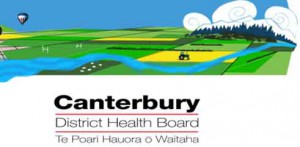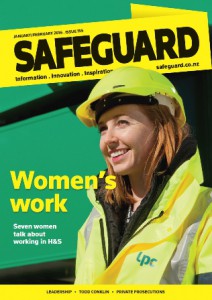Post quake well being
Andy Hearn describes the workshops run for Canterbury DHB line managers and staff to help them actively manage their own wellbeing in the challenging post-quake environment.
 The Canterbury health system has been through unprecedented change and challenges in the last five years since the first major earthquake struck the region on September 4, 2010. Our people are living through the largest facilities rebuild and earthquake repair programme ever in New Zealand. More than 12,000 hospital rooms have been damaged, and every ward in Christchurch hospital has had to move at some stage during the past 18 months to enable ongoing urgent repairs; and we are still in the process of demolishing more than 40 buildings.
The Canterbury health system has been through unprecedented change and challenges in the last five years since the first major earthquake struck the region on September 4, 2010. Our people are living through the largest facilities rebuild and earthquake repair programme ever in New Zealand. More than 12,000 hospital rooms have been damaged, and every ward in Christchurch hospital has had to move at some stage during the past 18 months to enable ongoing urgent repairs; and we are still in the process of demolishing more than 40 buildings.
Our people also continue to deal with the ongoing effects of the quakes on the Canterbury population, including an unprecedented increase in demand for mental health services. In addition to work-related demands, our people also continue to face multiple secondary stressors in their own lives, such as dealing with EQC and insurance companies, badly damaged roads, school closures, damaged homes, anxious and upset children, and the loss of sport/recreation infrastructure.
In this environment the resilience and mental wellbeing of everyone continues to be challenged.
Line managers crucial
The wellbeing/healthy workplaces literature repeatedly details the important role line managers have in supporting the wellbeing of their team members, and how closely linked this is, not only to engagement and productivity, but most importantly to staff/patient safety and the quality of patient care (see references).
The Canterbury DHB’s Staff and Family Wellbeing Survey 2012, completed by 2169 staff, showed many line managers were feeling burdened by their responsibility to lead teams in the post-quake environment. Many were experiencing significant quake-related issues outside work, while having to lead their teams through rapid and large scale change programmes.
It was clear to the Staff Wellbeing Action Group that line managers would benefit from additional support, and that any benefits gained by this group would have a scalable impact throughout the organisation.
This was particularly important because we also knew from the survey that a large number of general staff were stressed and fatigued, and that levels of physical activity and nutritional intake were suffering.
The WHO-5 wellbeing index (a validated assessment tool for surveying population based emotional wellbeing) was also used in the survey as it allows comparison of trends over time and comparison with other survey results for the wider Canterbury population and overseas surveys.
The pilot workshop
In October 2013 a pilot wellbeing workshop for line managers was run at Hillmorton Hospital. In attendance were 21 senior managers and senior clinicians from across the Canterbury DHB, many of whom were involved in other post-quake recovery initiatives throughout the CDHB and the wider community. The workshop ran for two and half hours, including a 20 minute break for refreshments and social connection.
The workshop covered topics including:
- Community Wellbeing Recovery
– Process and challenges
- The Importance of Wellbeing
– Psychological and emotional effects
- Promoting Health and Wellbeing
– Five Ways to Wellbeing
– Connect, Be Active, Give, Take Notice, Keep Learning
– Healthy Christchurch’s “All Right?” Campaign
– CDHB Staff Wellbeing Programme initiatives
- Skills for Self-Care and Stress Management (tools/exercises to take away)
– Engaging positive emotions
– Practicing appreciative perspective
– Connecting with others
The aim of the workshop was to provide evidence-based information and tools to encourage line managers to actively manage their emotional/mental wellbeing.
We were clear the initiative was not aimed at “getting more out of our staff”. It was about valuing our people and encouraging them to actively manage their wellbeing in a very challenging environment.
At the completion of the pilot workshop, feedback was sought and later presented to management, who agreed to fund a series of 25 workshops for line managers throughout 2014.
Workshops rolled out
The workshops had to be cost-effective. To achieve this, much of the work was done internally, including administration and promotion. The workshops were delivered across a number of hospital sites. While the majority of sessions were open to any line manager from any site, we also ran two sessions for specific groups of staff at the request of senior managers. In total more than 500 staff (mainly line managers) attended a wellbeing workshop during 2014.
Our evaluation of the workshops was limited to an online survey, sent to all participants immediately following the workshop they attended. The results (see table) represent a summary of responses from 438 line managers.
| LINE MANAGER POST-WORKSHOP SURVEY RESULTS | AVERAGE SCORE |
| The content provided was useful & valuable | 4.33 |
| I am confident to immediately apply what I have learnt | 4.30 |
| I will use the course material back in my workplace | 4.20 |
| I will use the course material in my life outside of work | 4.34 |
| I am now better equipped to reflect on the current state of my wellbeing & have a better appreciation of how I can more effectively manage my wellbeing | 4.21 |
| I am now more aware of how my wellbeing can impact on the people around me | 4.35 |
The Average Score column shows the average response using a five-level Likert scale, where 1 is“strongly disagree” and 5 is “strongly agree”. Both qualitative and quantitative feedback was extremely positive.
Evidence base
One key feature of the workshops was that the content needed to have a strong evidence base. We have a highly educated workforce and it was encouraging to get a large number of positive comments about the amount of evidence relating to personal wellbeing presented in the workshop. This included research related to:
- Five Ways to Wellbeing: New Economics Foundation
- Positive Psychology: PERMA model – Martin Seligman
- Pursuing happiness: Lyubomirsky, S. et al, 2005
This initiative deliberately set out to support line managers by providing knowledge and tools, encouraging them to actively manage their emotional/mental wellbeing during a period of unprecedented change, and by doing so achieve a “trickle down” effect on the wellbeing of general staff.
The programme was strongly supported by senior management, workshop content was evidence-based, and the evaluation data and general level of goodwill related to the programme suggests this was a valuable wellbeing intervention.
Using feedback from the post-workshop evaluation, including a question directly asking managers if they thought their staff would benefit from a similar workshop, we were able to secure funding for another 25 workshops, open to all staff, during 2015.
The 2015 workshops have had more of a focus on positive thinking, identifying and managing stress, and remaining resilient in an environment undergoing large scale change. We are currently summarising the 2015 evaluations and the quantitative results look almost identical to those shown above. Qualitative feedback is also very similar, with the majority of staff being very grateful for the opportunity to learn more about, and develop skills to support, their wellbeing.
References
- The Boorman Review – NHS Health & Wellbeing Review
- The Mid Staffordshire NHS Foundation Trust Public Enquiry (The Francis Report)
- Working for a Healthier Tomorrow
- The Wellness Dividend – Graham Lowe
- Staff Care: How to engage staff in the NHS and why it matters
- Implementing Human Factors in Healthcare
- Through the Eyes of the Workforce: Creating joy, meaning and safer health care
 Andy Hearn is staff wellbeing coordinator with Canterbury District Health Board.
Andy Hearn is staff wellbeing coordinator with Canterbury District Health Board.
He was the Winner of the NZ Workplace Wellbeing Award 2013 (Best New Programme) and a finalist in the NZ Workplace Health & Safety Awards 2015.
This article first appeared in Safeguard Magazine Issue 154 - November/December 2015
Read more Safeguard articles
 Safeguard is New Zealand's leading publication on workplace health and safety.
Safeguard is New Zealand's leading publication on workplace health and safety.
This article is one of several free stories available in every issue. One in the current issue features Nigel Hampton QC's article Legal View point - Going Private. He says his experience prosecuting two forestry companies demonstrates the value of private prosecutions in holding the regulator to account.
Now everything “Health and Safety” is conveniently located in one hub: the magazine Safeguard, other publications and resources, information about events, suppliers, jobs …
To find out more please visit: Safeguard OSH Solutions